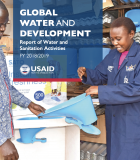Institutional Strengthening and Support Program (ISSP)
Jordan is one of the most water-scarce countries in the world. Rapid population growth coupled with economic development needs places huge strain on already limited water supplies. The added burden of a large refugee influx has caused water demand to rise more than 20% in just three years. While Jordan is a regional leader in areas of water management including reuse, water quality and level of service, the water sector remains in crisis. Water sector institutions struggle to meet ever-growing demand for sufficient and safe water, and groundwater extraction exceeds sustainable supply. Furthermore, water sector institutions face weaknesses related to financing, governance, sector structure, technical and planning capacity, infrastructure repair, and investment backlogs.
To help Jordan face these challenges, the Institutional Support & Strengthening Program (ISSP) worked closely with the Ministry of Water and Irrigation (MWI), Water Authority of Jordan (WAJ), Jordan Valley Authority (JVA), and government owned water utilities to reform and restructure the sector to become more efficient, sustainable, and responsive to consumer needs. ISSP provided technical assistance for better management of water and wastewater services and addressed key institutional constraints to more effective sector management and efficient service delivery. These measures helped Jordan respond to current pressures and addressed future needs in order to achieve better water security.
Activity Description
- Strengthened and consolidated authority for water planning and management to address the over-extraction of groundwater, improve sector planning, and ensure better quality of data used in decision-making. Solutions included capacity building, policy reform, process improvements, legal reforms and institutional restructuring.
- Reorganized WAJ to focus on its core mandate (sector investment and bulk water source development/supply) to improve operational efficiency and better plan for future water supply and wastewater service needs.
- Focused on capacity to manage new national water supplies and removing institutional conflicts of interest between bulk water supply, utility oversight and retail service delivery.
- Strengthened utility management to support service improvement, further corporatization, and management/fiscal/operational independence.
- Improved water utility regulation to enhance the monitoring of utilities’ financial and technical performance.
- Strengthened water users associations and the Jordan Valley Authority to further separate bulk and retail water management to improve irrigation water management and services across the Jordan Valley.
- Established and supported the National Water Policies Advisory Council to improve transparency, accountability and shared responsibility for water policy.
- Conducted technical studies to provide analysis for better policy and water management decision-making.
Expected Outcomes
- Improved Environmental Protection
- Optimization of Water Resources
- Strengthened Water Policies and Systems
- Improved Resources Allocation
Actual Outcomes
- Helped develop and install groundwater management tools and systems at all water basin offices, providing accurate data on groundwater extraction, meter reading, geographic information systems (GIS), and water use violations. The process of collecting and sharing data has been shortened from months to days, and violations data is now systematized to strengthen enforcement against illegal water use.
- Established a process for validating water extraction data between MWI and WAJ.
- Developed the National Strategic Wastewater Master Plan (WWMP), which is now the national planning framework for all wastewater investments. $210 million in donor funding has been leveraged in less than two years, and 26 new projects are now underway with planning time accelerated by the WWMP.
- Digitized private groundwater well licenses, reducing the time needed to develop a well report from several months to several minutes and strengthening the application review process for well licenses. Also developed an archive system for historical well licenses, resulting in the review and clean-up of historical data.
- Published numerous technical studies, including: Water Sector Valuation Study of Irrigated Agriculture, Institutional Assessment of Jordan Valley Authority, and Socio-economic Impact Assessment of Groundwater Use in Jordan.
- Secured minister approval for the Water Utility Regulatory Unit, paving the way for the program management unit to begin work as the emerging utility regulator.
- Developed a database of key performance indicators, provided capacity building, and conducted regulatory readiness assessments for WAJ and the Yarmouk Water Company.
- Updated and verified data on well locations, cultivated areas, and water available for extraction. Also conducted analysis on labor, the socio-economic status of farming families, and stakeholder/service provider relations, enabling officials to make evidence-based decisions on groundwater policy, use and allocation.
- Assisted the passing and enactment of an MWI by-law amendment, restructuring the Ministry based on ISSP-led reforms to improve management and planning capacity. ISSP continues to provide capacity building and support to the restructuring process.
- Helped institutionalize Miyahuna’s five-year business plan through management support. ISSP provides ongoing operational/financial monitoring, yearly updates under the guidance of a strategic planning manual, and helped Miyahuna obtain $30 million in direct USAID funding through assistance meeting audit requirements.





